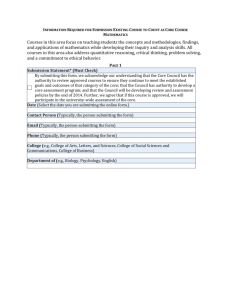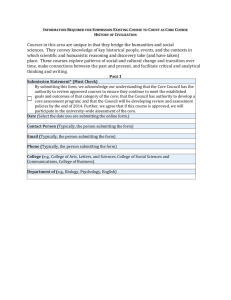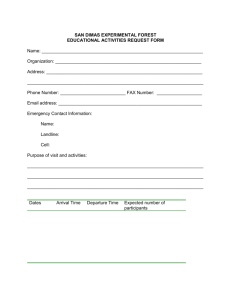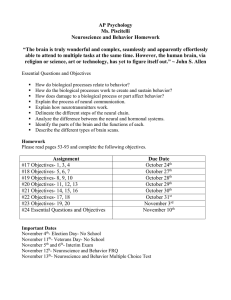Information Required for Submission Existing Course to Count as
advertisement
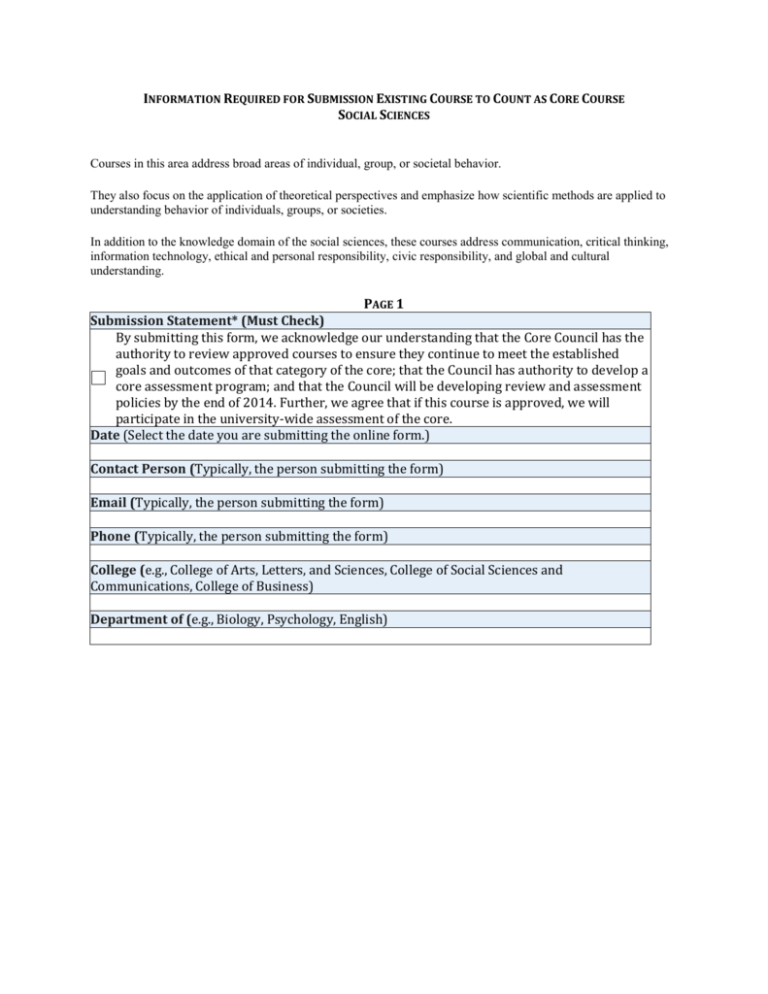
INFORMATION REQUIRED FOR SUBMISSION EXISTING COURSE TO COUNT AS CORE COURSE SOCIAL SCIENCES Courses in this area address broad areas of individual, group, or societal behavior. They also focus on the application of theoretical perspectives and emphasize how scientific methods are applied to understanding behavior of individuals, groups, or societies. In addition to the knowledge domain of the social sciences, these courses address communication, critical thinking, information technology, ethical and personal responsibility, civic responsibility, and global and cultural understanding. PAGE 1 Submission Statement* (Must Check) By submitting this form, we acknowledge our understanding that the Core Council has the authority to review approved courses to ensure they continue to meet the established goals and outcomes of that category of the core; that the Council has authority to develop a core assessment program; and that the Council will be developing review and assessment policies by the end of 2014. Further, we agree that if this course is approved, we will participate in the university-wide assessment of the core. Date (Select the date you are submitting the online form.) Contact Person (Typically, the person submitting the form) Email (Typically, the person submitting the form) Phone (Typically, the person submitting the form) College (e.g., College of Arts, Letters, and Sciences, College of Social Sciences and Communications, College of Business) Department of (e.g., Biology, Psychology, English) PAGE 2 Course ID (e.g., ENG 2337, CRJU 2300, PSYC 2300) Course Title (e.g., World Literature, Introduction to Criminal Justice, Psychology and the Human Experience) Existing Catalog Description (In this section, please provide the course catalog description.) How will your department ensure a level of consistency among sections of this course? (Please provide a narrative on how your department will ensure a level of consistency among various sections of this course. Be sure to include how this course will be consistent among different faculty members, adjuncts, student teachers, and various sections that may be offered online.) PAGE 3 Knowledge 1 – Concepts, methodologies, findings, and applications of mathematics and the social and natural sciences, engineering and technology. Learning Outcomes Students will . . . 1. develop foundational knowledge of the theoretical perspectives used in one or more social science disciplines; 2. develop foundational knowledge of how to use scientific methods and various analytic techniques to answer questions about societal issues; 3. develop foundational knowledge of real world applications of the social sciences; Learning Objectives- Knowledge 1.1 Assignments- Knowledge 1.1 Explanation- Knowledge 1.1 Learning Objectives- Knowledge 1.2 Assignments- Knowledge 1.2 Explanation- Knowledge 1.2 Learning Objectives- Knowledge 1.3 Assignments Knowledge 1.3 Explanation- Knowledge 1.3 PAGE 4 Skills 1 – Communication Learning Outcomes Students will . . . 1. develop oral and/or written skills while communicating about social science theories, methods, and applications; Learning Objectives-Skills 1.1 Assignments- Skills 1.1 Explanation- Skills 1.1 PAGE 5 Skills 2 – Critical thinking, Quantitative Reasoning, and Solving Problems Individually and Collaboratively Learning Outcomes Students will . . . 1. develop an understanding of how evidence from different methods of inquiry supports or weakens various theoretical perspectives; 2. develop an awareness of contextual impacts and personal assumptions on inquiry, methods, and analysis within a social science discipline; Learning Objectives-Skills 2.1 Assignments-Skills 2.1 Explanation-Skills 2.1 Learning Objectives-Skills 2.2 Assignments-Skills 2.2 Explanation-Skills 2.2 PAGE 6 Skills 3 – Information Technology Learning Outcomes Students will . . . 1. develop abilities to use current technologies for inquiry, exploration, and communication; Learning Objectives-Skills 3.1 Assignments-Skills 3.1 Explanation-Skills 3.1 PAGE 7 Values 1– Personal Responsibility and Ethical Behavior Learning Outcomes Students will . . . 1. 2. 3. develop commitment to academic integrity and take responsibility for completing assignments in an ethical manner, working on one’s own when required and acknowledging resources when used; develop an understanding of the ethical obligation to be precise and accurate with data; and understand how this obligation applies to communication of information; understand the ethics of research with humans; Learning Objectives-Values 1.1 Assignments-Values 1.1 Explanation-Values 1.1 Learning Objectives-Values 1.2 Assignments-Values 1.2 Explanation-Values 1.2 Learning Objectives-Values 1.3 Assignments-Values 1.3 Explanation-Values 1.3 PAGE 8 Values 2 – Civic Responsibility Learning Outcomes Students will . . . 1. develop an understanding of the ethical implications of social science research, methods, knowledge in addressing social issues; Learning Objectives-Values 2.1 Assignments-Values 2.1 Explanation-Values 2.1 PAGE 9 Values 3 – Global and Cultural Understanding Learning Outcomes Students will . . . 1. develop awareness of multiple cultures and respect for alternate world views. Learning Objectives-Values 3.1 Assignments-Values 3.1 Explanation-Values 3.1 Additional Comments
